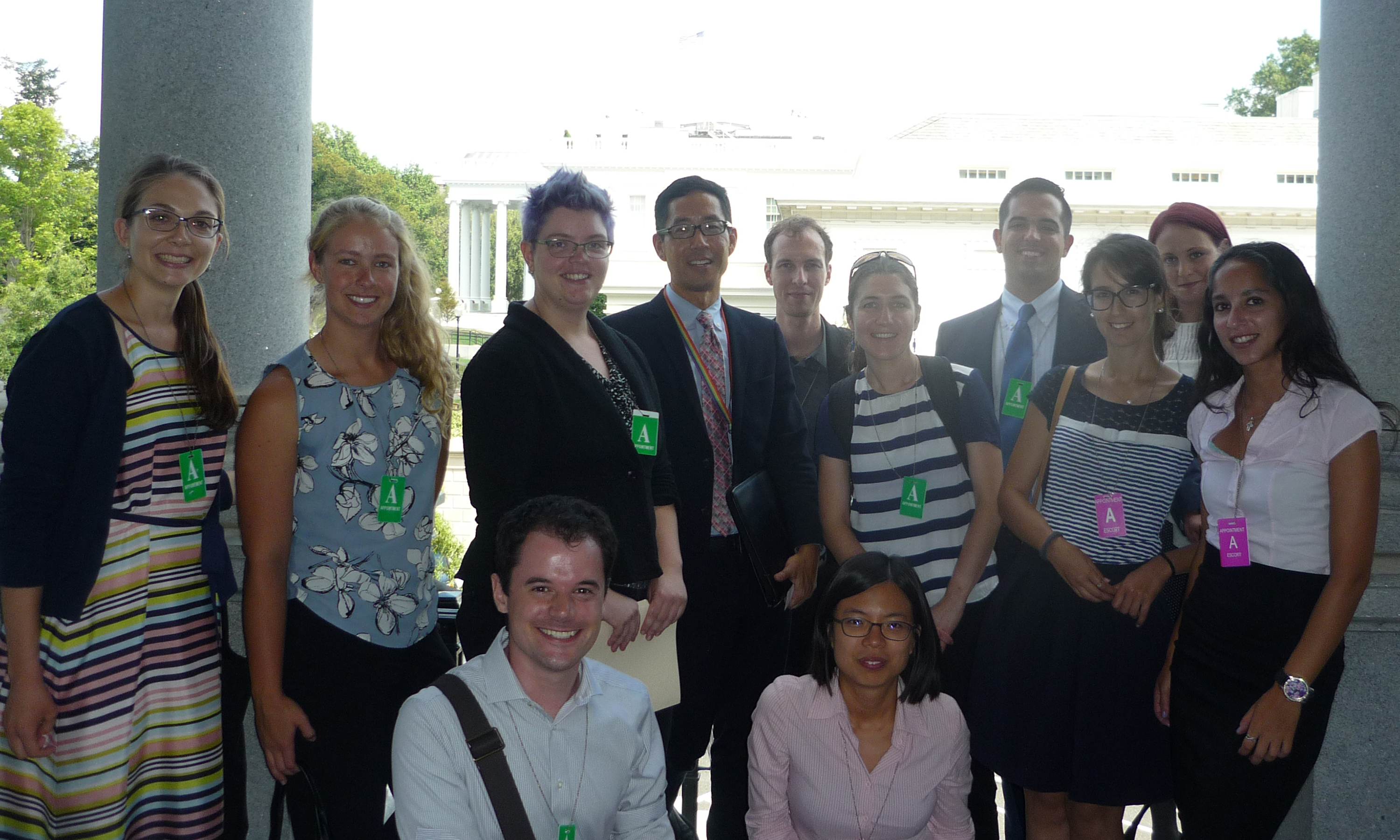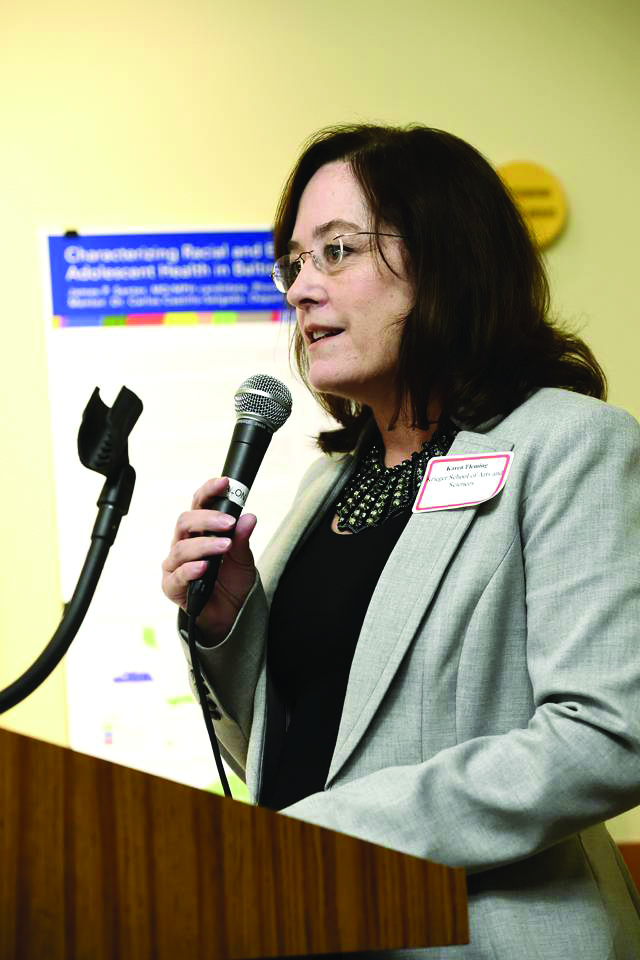It’s just data: Women in biological chemistry
What unique challenges do women in science, technology, engineering and mathematics face? What contributions do they make to their fields?
In 2014, Karen Fleming — a professor of biophysics at Johns Hopkins University — decided to address these questions using her critical thinking skills. “I am a scientist and I like to approach topics with data and evidence, so I wanted to approach the topic (of women in STEM) in that way,” she said.
Fleming began exploring the data through a journal club at Johns Hopkins with approximately 40 graduate students, postdoctoral scholars and faculty. The journal club read and discussed social psychology publications about gender equity in STEM, with a focus on the impact of biases, confidence and emotion. This literature included a seminal 2012 report demonstrating that, based on application materials, science faculty at research universities were more likely to hire a lab manager with a male versus female name. These faculty also rated the male applicant as more competent and would offer him a higher salary and more mentoring.

The group also discussed a study of how expressions of anger and sadness by women in the workplace are perceived compared to such expressions by men. The results showed that anger improves the professional status of men but decreases that of women, and sadness negatively impacts the status of men but has the opposite effect for women.
Journal club participants also critically examined their personal implicit biases and confidence levels, and identified progress and areas for improvement in institutional reports about the gender equity climate at their home institution.

Over time, the journal club expanded into seminars about gender equity and workshops about bias held around the country (a recording of Fleming’s workshop at the Biophysical Society’s 2019 annual meeting is available here).
“The workshops and seminars gave (women in STEM) an evidence-based vocabulary for discussing issues with stakeholders in the community who are not us,” Fleming said. “By framing our experiences with data, we can work within the system to make it better.”
Two scientists who attended Fleming’s journal clubs, seminars and workshops as graduate students said these experiences educated them about gender equity and bias in STEM and opened their eyes to the limited representation of women in their fields.
“I appreciated that the journal clubs approached social psychology papers in an analytical way,” said Ashlee Plummer, a former graduate student at Johns Hopkins, now a postdoctoral fellow at Harvard. “We looked at the hypothesis and then the data, just like we would with any (biophysics) paper. That really helped me think objectively about the issues.
“I never thought that gender bias applied to me, but the journal clubs made me pay attention to my environment, and I realized how few women were in the room.”
Fleming’s work inspired Johns Hopkins graduate student Emily Han to advocate for the inclusion of women scientists in a podcast about neuroscience she created with a fellow Australian National University alumnus.
“We don’t learn about many women scientists in textbooks,” Han said, “and it’s easy to accept this as reality, but there are actually lots of women scientists — for example, Mary Ainsworth, Barbara King and Shelley Taylor — who have made important contributions to the field (of neuroscience and mental health).”
Though 2020 brought a pandemic along with political and social unrest, Fleming continued to think deeply about women in STEM. In September, she hosted a screening of the film “Picture a Scientist” — which uses data to examine gender equity in STEM at academic institutions — followed by a virtual panel discussion for the Johns Hopkins community.
In her role as an associate editor of the Journal of Biological Chemistry, Fleming teamed up with Catherine Goodman, the JBC’s scientific editor, to assemble a special virtual issue titled “Women in Biological Chemistry.” Published in August, the special issue includes a selection of Editors’ Pick papers (typically in the top 5% of papers) published in the past three years that have women as corresponding authors.
“We were inspired to create the collection by the 100th anniversary of the 19th amendment,” Fleming and Goodman wrote in a joint statement. “This virtual issue simultaneously celebrates progress made in regards to the participation of women in science and serves as a reminder that we have much work still to do to fully include women, and particularly women of color, in the scientific endeavor.”
Here is a sample of the innovative science featured in the issue:
-
The pathogen Mycobacterium tuberculosis requires the vitamin menaquinone for energy generation. Hence, the vitamin is an enticing drug target for a difficult-to-treat disease. An article by Ghader Bashiri, Jodie Johnston and colleagues describes how they characterized the biosynthesis of menaquinone through X-ray crystallography and spectroscopy of the catalyzing enzyme. The results demonstrate that a metabolite produced during menaquinone biosynthesis binds to and inhibits the catalyzing enzyme. The study also identifies influential residues in the metabolite’s allosteric binding pocket. This feedback regulation pathway may be a target for future M. tuberculosis treatments.
-
Secretory granules store insulin in pancreatic β-cells; after glucose stimulation, these vesicles move to the plasma membrane and release their cargo. Factors such as motility and age influence secretory granule dynamics and represent a potential therapeutic target for diabetes. In a recent study, Belinda Yau, Melkam Kebede and colleagues examined secretory granule dynamics using a fluorescent reporter that localizes to the vesicles and changes color over time. The results show that young secretory granules located closer to the plasma membrane — the preferential source for insulin — are more abundant in healthy β-cells than diabetic β-cells.
-
The distinctive amyloid plaques observed in Alzheimer’s disease form when amyloid-β, or Aβ, peptides self-assemble into oligomers, then protofibrils and finally mature fibrils. The molecular chaperone DNAJB6 inhibits amyloid formation, but this protective function is undercharacterized. In a new report, Nicklas Österlund, Cecilia Emanuelsson and colleagues write that they used native mass spectrometry to analyze the impact of DNAJB6 on Aβ peptide aggregation. The study demonstrates that DNAJB6 binds to Aβ peptide oligomers, preventing progression to protofibrils and mature fibrils, and that this interaction is dependent on DNAJB6’s serine/threonine-rich motif.
Recommended reading and groups
For anyone interested in exploring gender equity in STEM through a data-driven lens, Johns Hopkins professor of biophysics Karen Fleming recommends the National Academies of Sciences, Engineering and Medicine’s 2018 report “Sexual harassment of women: Climate, culture and consequences in academic sciences, engineering and medicine” (see Fleming’s analysis here).
"This report has a lot of data in it and provides a good framework for thinking about why the climate is hostile to women and how it can be changed,” Fleming said. “It’s an important report for the entire STEM community, not just women, because these issues impact everyone.”
Additionally, groups such as the Association for Women in Science, American Association of University Women, Women in Bio, Society of Women Engineers and 500 Women Scientists support and promote gender equity in STEM.
Enjoy reading ASBMB Today?
Become a member to receive the print edition four times a year and the digital edition monthly.
Learn moreFeatured jobs
from the ASBMB career center
Get the latest from ASBMB Today
Enter your email address, and we’ll send you a weekly email with recent articles, interviews and more.
Latest in Careers
Careers highlights or most popular articles

Decoding how bacteria flip host’s molecular switches
Kim Orth will receive the Earl and Thressa Stadtman Distinguished Scientists Award at the ASBMB Annual Meeting, March 7–10, just outside of Washington, D.C.

Defining JNKs: Targets for drug discovery
Roger Davis will receive the Bert and Natalie Vallee Award in Biomedical Science at the ASBMB Annual Meeting, March 7–10, just outside of Washington, D.C.

Upcoming opportunities
No matter where you are in your career and what future path you aspire to, everyone needs leadership skills. Join ASBMB for practical strategies for building and practicing leadership skills.

Close out ASBMB 2026 with a bang
The closing reception of the 2026 ASBMB Annual Meeting will be held at the Torpedo Factory Art Center in Alexandra, Virginia.

Redefining lipid biology from droplets to ferroptosis
James Olzmann will receive the ASBMB Avanti Award in Lipids at the ASBMB Annual Meeting, March 7–10, just outside of Washington, D.C.

Creating change in biochemistry education
Pamela Mertz will receive the ASBMB William C. Rose Award for Exemplary Contributions to Education at the ASBMB Annual Meeting, March 7-10 in Washington, D.C.

